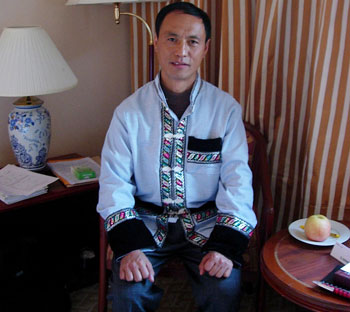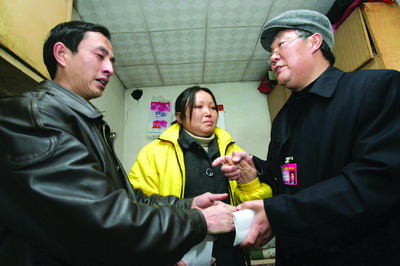| Tools: Save | Print | E-mail | Most Read |
| Religion Can Contribute to Building a Harmonious Society |
| Adjust font size: |
Different religions, as an important part of China's social structure, can play unique roles in promoting a "harmonious society" and contributing to world peace, said Yu Wenliang and Liu Deshen, noted Christian leaders and members of the 10th National Committee of the Chinese People's Political Consultative Conference (CPPCC).
Yu Wenliang
Liu Deshen Rev. Yu, a standing member of the National Committee of the Three-self Patriotic Movements of the Protestant Churches of China, along with Liu, director of the Chinese Catholic Social Service Committee, are attending the 12-day annual session of the CPPCC National Committee, which opened in Beijing on March 3. According to Yu, religions may help cultivate believers' moral integrity, steer them away from materialistic temptations, and build their will against adversity. "All types of Christianity have their own taboos and codes of conduct for their followers. They include those that prohibit followers from committing such sins as stealing, robbing, telling lies, and coveting the wealth of others and those encouraging followers to help those in need. All these exactly match what a decent citizen is required to be today. From this perspective, religion can certainly contribute to the building of a harmonious society," said Yu. "Meanwhile, the religious organizations in China, including Islam, Christianity, Buddhism, and indigenous Taoism, also play an active role in both NGO and government-operated philanthropy," Liu added. "For example, the Chinese Catholic Social Service Committee has financed thousands of dropout children so they can go back to school, and built over 300 elementary schools, 60 of which are located in Chongqing Municipality. We did a lot of work to help those disadvantaged children." On March 4, China's top political advisor Jia Qinglin called on religious groups to give full play to the positive role of religion to boost social harmony at a panel discussion with the country's political advisors from religious community. Jia also called for frequent exchanges between different religions and between religious believers and non-religious people to promote social stability and unity, and happiness of the people. Catholic influence reached China after the seventh century, and Protestantism was introduced into China in the early 19th century. Now there are more than 4,600 Catholic churches and over 12,000 Protestant churches, as well as over 25,000 other types of Christian places of worship in China. (China.org.cn by staff reporter Wu Nanlan, March 13, 2007) |
| Tools: Save | Print | E-mail | Most Read |
 |
| Related Stories |
|
Product Directory China Search |
Country Search Hot Buys |

